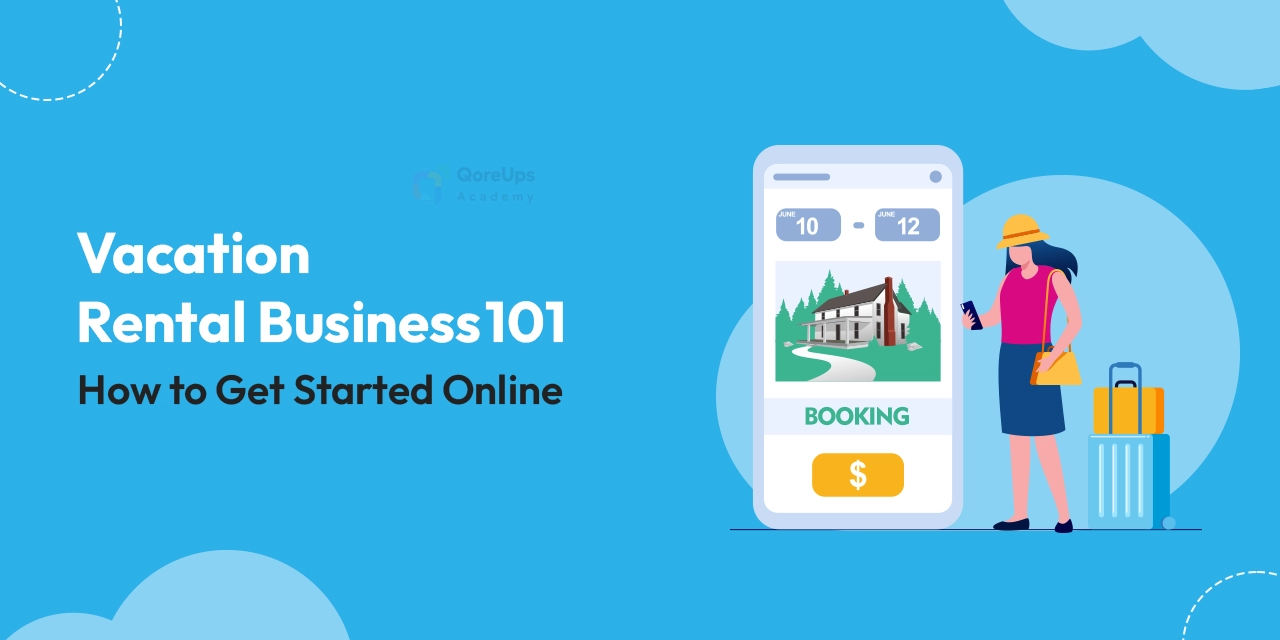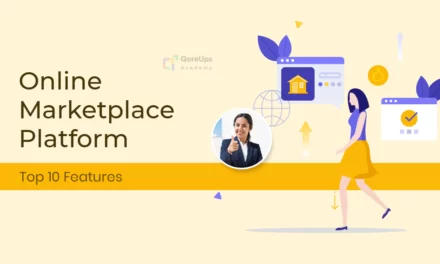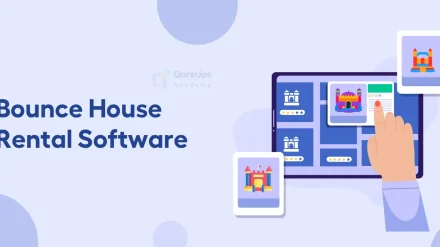The vacation rental business can be highly profitable, but only if approached with solid planning.
- Have you ever wondered what it really takes to succeed in this profitable market?
- What if you could turn a simple property into a steady stream of income?
- How do the top vacation rental entrepreneurs manage to scale effortlessly?
If these questions echo with you, you’re in the right place.
This comprehensive guide dives deep into every critical aspect of building a successful vacation rental business online.
By the end, you should be equipped to run an online vacation rental business in a successful way.
Let’s start…
Key Takeaways
- Plan and understand your business model: Know which rental approach suits your goals and capabilities.
- Legal and financial compliance is essential: Secure necessary permits, pay applicable taxes, and invest in insurance to protect your business.
- Choose and prepare properties thoughtfully: Location, amenities, and guest comfort directly impact bookings and reviews.
- Leverage technology wisely: Use vacation rental software to automate and streamline operations, improve guest experience, and gain insights.
- Optimize listings and communication: Professional photos, clear descriptions, and timely guest messaging boost conversion and satisfaction.
- Prepare for growth and disruption: Scale gradually with standardized systems, build a trusted team, and have contingency plans for unexpected challenges.
- Balance short and long stays: Catering to both can help maximize revenue and reduce operational strain.
- Embrace sustainability and local partnerships: These add value and appeal to increasingly eco-conscious guests.
What is an Online Vacation Rental Business Model, Really?
An online vacation rental business model is when property owners or managers rent out furnished residential spaces—such as apartments, villas, or homes—for short-term stays, typically ranging from a single night to a few weeks.
Instead of operating like a traditional hotel, the owner lists the property on platforms such as Airbnb, Vrbo, or Booking.com or manages bookings through their own website.
But there are different ways to run this business, and it’s good to know the options:
- Owner-operated model: You own the property and take care of everything yourself.
- Lease or master lease model: You rent a place for a long time, then rent it out to guests for shorter stays.
- Co-hosting: Someone owns the property, and you help manage it. You both share the profits.
- Full property management: You don’t own any property but manage rentals for other owners and get paid a fee.
Each way comes with different responsibilities, costs, and risks. Knowing which one fits you best is important.
How to Measure Profitability: Key Metrics You Need to Track
| Metric | What it tells you | Typical benchmarks* |
| Occupancy rate | % nights rented vs available | 60‑80% in many holiday markets; may drop in off‑season |
| ADR (Average Daily Rate) | What do you charge per night | Varies by location; luxury or niche gets more premium |
| RevPAR (Revenue per Available Room/Unit) | Combines occupancy and ADR | A good gauge of maximizing the use of your inventory |
| Cleaning / Turnover cost per booking | Cost to reset the property between guests | High turnover properties need efficiency |
| Operating costs (utilities, maintenance, software, staff) | Determines profit margins | Can be 20‑40% of gross revenue in many cases once mature |
These numbers depend heavily on your location, seasonality, demand, and niche. Looking at local comps (local comparable properties) helps you set the right price and understand the competition.
Steps to Start a Profitable Online Vacation Rental Business
Legal, Tax, and Insurance Considerations
This is often the make-or-break segment. Skipping proper legal or tax compliance can lead to fines, shutdowns, or reputational damage.
Legal Considerations
- Zoning / Use regulations: Some cities restrict short-term rentals (STRs). For instance, certain residential areas or apartment societies may disallow them. Always check municipal bylaws, housing society rules (in India), or lease restrictions.
- Licensing / Permits: Many jurisdictions require a STR license or registration. Some require safety inspections, fire certificates, health & sanitation clearances.
- Consumer protection and truthful listings: False or misleading amenities or descriptions can lead to legal claims. Guests may expect what’s listed. In many places, consumer law protects guests if the accommodation doesn’t meet advertised standards.
- Privacy and data handling: If you collect guest personal information (ID, passport, payment details), you must comply with relevant data protection laws (GDPR, local equivalents).
Tax Considerations
- Income tax: Rental income is taxable. Be sure to track your revenue and allowable expenses (repairs, utilities, cleaning, property depreciation, license fees, software subscriptions).
- Local lodging/occupancy/hotel taxes: Many municipalities or states levy taxes on STR (Short-Term Rental) occupancy, much like hotels.
- GST/VAT (if applicable): In some countries like India, if the rental/provision of services crosses thresholds, GST may apply. Handling invoicing appropriately is critical.
Insurance
- STR‑specific insurance: covers damage by guests, liability, loss of income, etc.
- Damage deposit/insurance: To protect your property from accidental damage by guests, you can either collect a refundable damage deposit or use damage protection insurance.
- Safety features: Fire extinguishers, smoke alarms, carbon monoxide detectors (where relevant), emergency exit info. Ensures compliance and reduces liability risk.
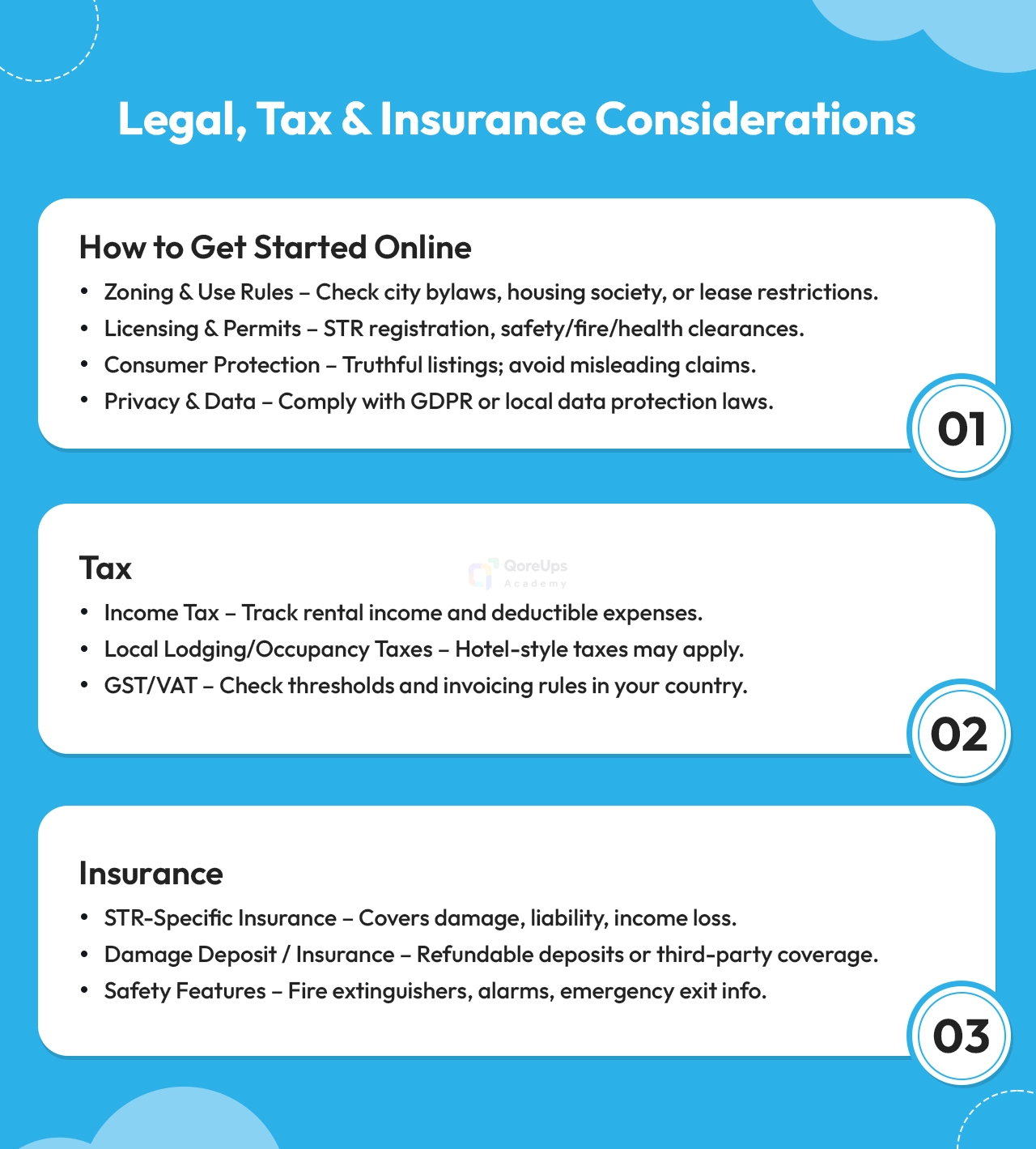
Find and Prepare the Right Property
This goes well beyond just buying or leasing a building. The right property, well prepared, can make scaling far easier.
Choosing the Property
- Demand & Market Research: Use tools like AirDNA, STR insights, and local OTA data to understand occupancy, seasonal peaks, and high-demand windows in your city or region. What types of properties are guests booking? What nightly rates do similar properties get? This informs both location and property type selection.
- Property Type and Size: Studios or 1‑bedrooms may have high occupancy but many turnovers. Larger homes or villas may yield higher ADR but more maintenance. Balance returns vs complexity.
- Amenities & Differentiation: What makes your property special? For example: sea view, proximity to public transport, pet‑friendly, smart features, kid-friendly, sustainability, and luxury touches. Guests are willing to pay more for unique experiences.
- Regulatory feasibility: Ensure property allows STR use (zoning, society rules, lease agreements). If acquiring a new property, check the property tax and municipal rules.
Preparing the Property
- Furnishing & comfort: Quality linens, furniture, good lighting, functional kitchen equipment, comfortable beds. High‑quality photos demand high presentation. Small touches (welcome snacks, local guides) multiply guest satisfaction.
- Smart infrastructure: WiFi, high-speed internet, keyless entry or smart locks, good heating/cooling, water pressure/reliable amenities.
- Cleaning / Turnover systems: Design your property so that cleaning and turnover are efficient (e.g., standardized layout, durable finishes, easy-to-clean surfaces).
- Guest safety & emergency: Fire safety equipment, well-marked exits, first‑aid kit, emergency contact list, backup power if relevant.
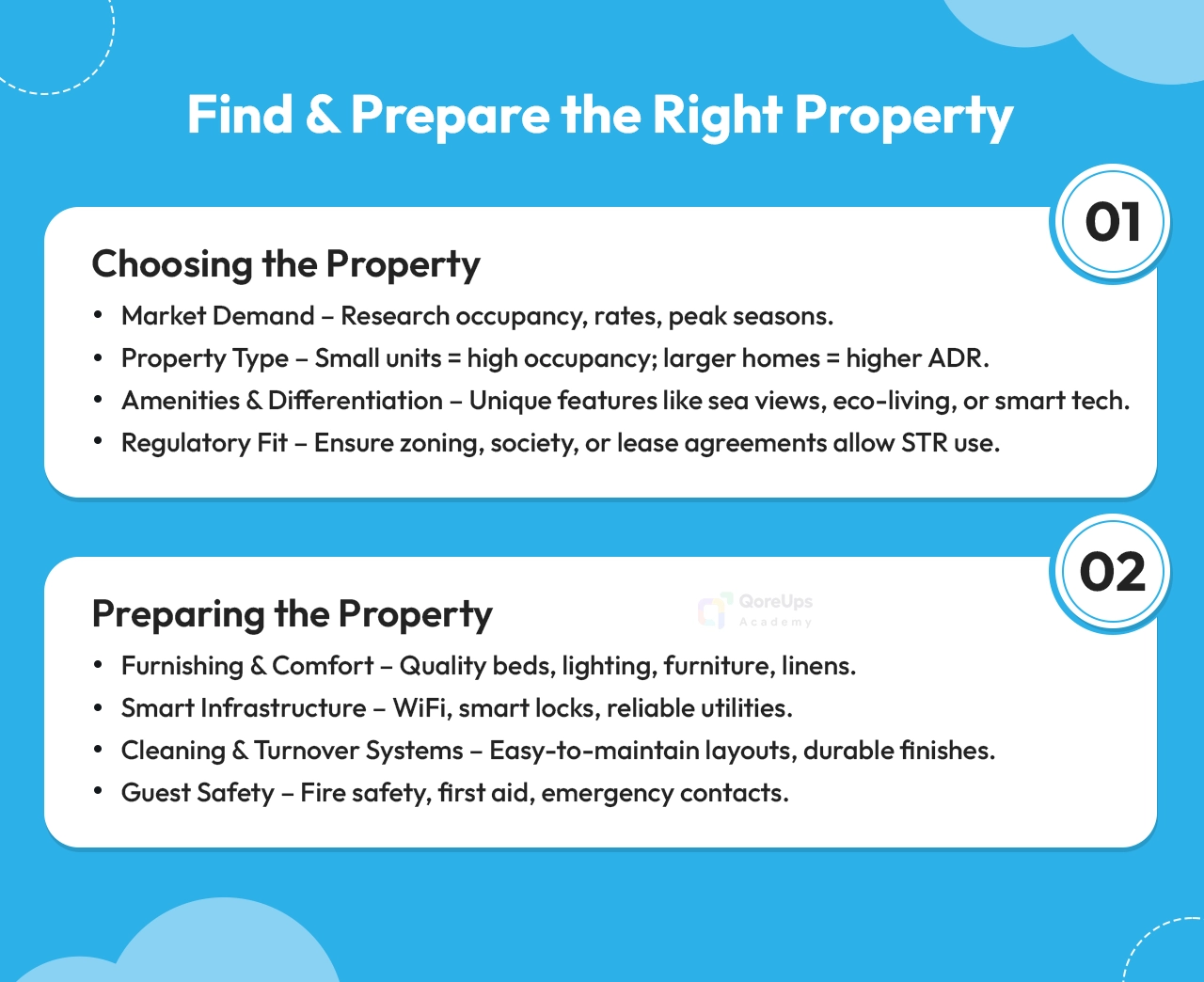
Choose the Best Vacation Rental Software
This part can make or break scalability. The right vacation rental property management software will automate, integrate, provide insights, reduce errors, and allow you to deliver consistent quality.
Key Features of the Best Vacation Rental Software
Take a look at this list of essential features and why they’re important to your vacation rental management.
| Feature | Why It Matters |
| Reservation Management | Easily handle bookings, cancellations, and guest info in one place. |
| Guest Communication Tools | Send confirmations, check-in details, and replies quickly. Automated emails save time. |
| Payment Processing | Collect secure payments, manage deposits, and handle refunds with ease. |
| Reporting & Analytics | Understand performance; identify profitable properties; make data-driven decisions. |
| Task & Cleaning Management | Coordinate cleaners and maintenance personnel; ensure quick turnarounds; track tasks. |
| Guest Screening & Insurance Integrations | Reduce risk from guests; manage deposits and damage protection. |
| Direct-Booking Website & Payment Gateway | Avoid OTA fees; foster repeat guests; control branding. |
| Integrations (Smart Devices, Locks, Noise Sensors) | Improve guest experience; reduce need for staff; lower operational costs. |
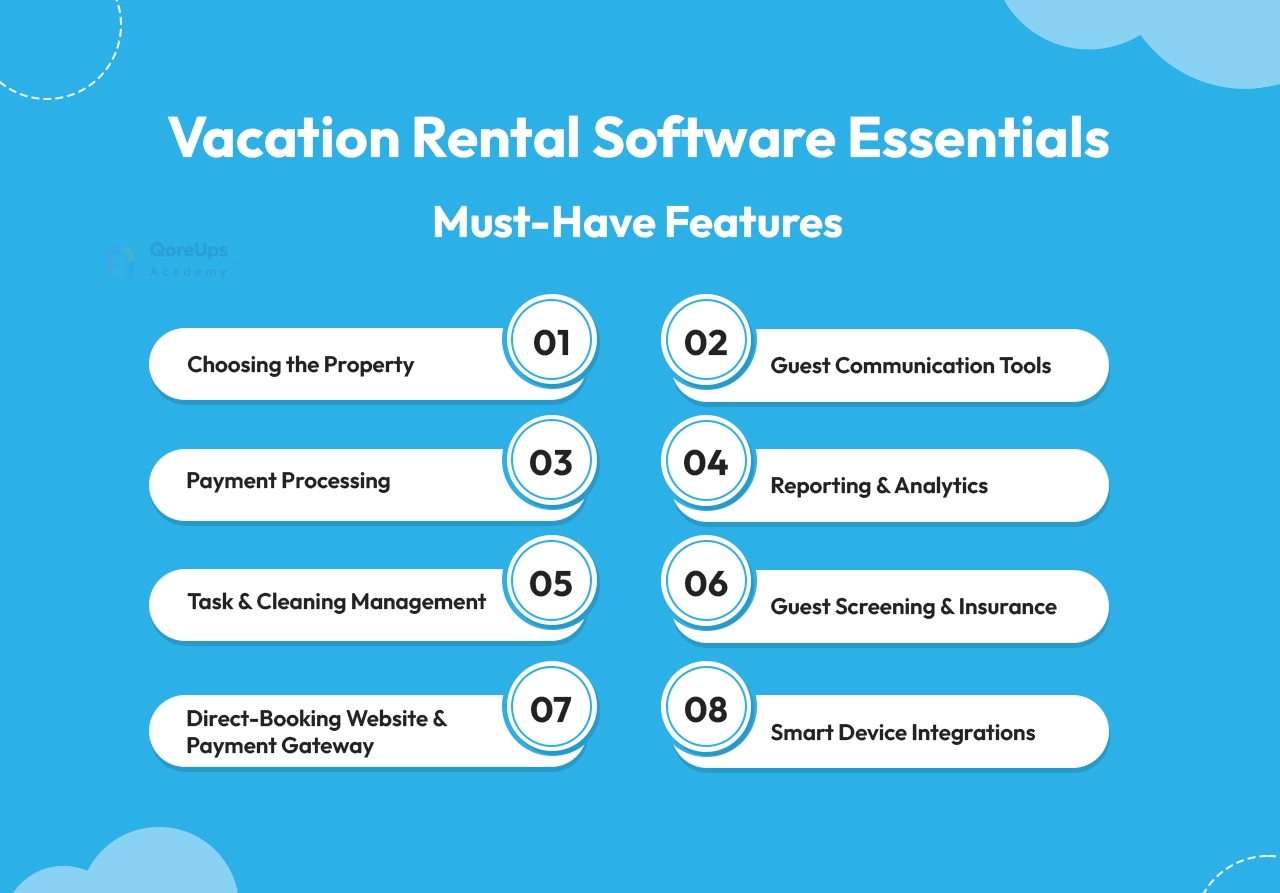
Some Best Vacation Rental Software Options & Comparison
A look at some top property management tools, including what they’re best at and potential downsides to keep in mind.
| Software | Best For / Strengths | Potential Drawbacks |
| Guesty | Excellent for medium to large property managers; very strong in automation and multi-channel management. | Pricier; may be overkill for one or two properties. |
| Hostaway | Good overall balance; strong channel integration; unified dashboards. | Some advanced features may require add-ons; customer service varies by region. |
| Lodgify, OwnerRez, BookingSync | Great for simpler, more affordable systems; ideal for direct booking options. | May lack enterprise-level automation or integrations available on larger platforms. |
| QMarket | Affordable subscription fees; offers own branding for greater control; helps maximize earnings with direct bookings and lower fees. | May not include some advanced features. |
What Makes the Best Vacation Rental Management Software?
What do we mean by “best vacation rental management software” or “best vacation rental software”? Here are some criteria:
- It automates many manual tasks, saves you valuable time, and enables your business to grow without adding more workload.
- It integrates well with OTAs, payment gateways, lock systems, etc.
- It has transparent pricing (not too high fees per booking).
- It supports data & insights so you can see occupancy, ADR, cost per guest, etc., per property and aggregate.
- Good support & reliability, especially if you manage properties in multiple locations.
👉 If you want a deep dive into selecting the right software, see our related post: How to Choose the Best Property Management Software for Vacation Rentals?
Create and Optimize Your Online Listings
You may have the best property and the best software, but if your listing doesn’t convert or show up well, revenue suffers.
Listing Optimization Deep Dive
- Photography: Use wide‑angle lenses, ensure good lighting, and stage rooms well. Hire professional photographers if possible. Highlight the unique / best features: view, sunsets, decor, and amenities.
- Titles & Descriptions: Use emotional, benefit‑oriented wording (“relaxing beach view”, “family‑friendly hub”, “walking distance to ___”), include practical details. Use keywords potential guests will search for (e.g., “sea view villa”, “high speed WiFi”, “pet friendly”). Describe what’s unique.
- Amenities & Extras: Provide amenities that are considered “must‑haves” nowadays: WiFi, workspace, AC/heating, reliable water, and cleanliness. Extras (things like welcome snacks, guides, and local experience) can differentiate.
- Pricing Strategy:
- Use dynamic pricing tools integrated into your vacation rental software to react to seasonal demand, events, and holidays.
- Set minimum stay requirements, fine-tune your pricing with custom discounts, and offer special rates for longer stays to attract more guests.
- Use dynamic pricing tools integrated into your vacation rental software to react to seasonal demand, events, and holidays.
- Calendar Management: Always keep your availability up to date. Sync calendars to avoid double bookings. Long gaps between bookings translate to lost revenue.
- Guest Communication & Response Time: Fast replies improve ranking in many OTAs. Use automated messaging for FAQs. Personalization matters — even automated messages should feel warm.
- Reviews & Ratings: Every listing platform (Airbnb, Vrbo, etc.) uses review scores as ranking signals. Make review proactivity part of your system (e.g., after check‑out, ask for feedback; follow up; respond publicly to reviews).
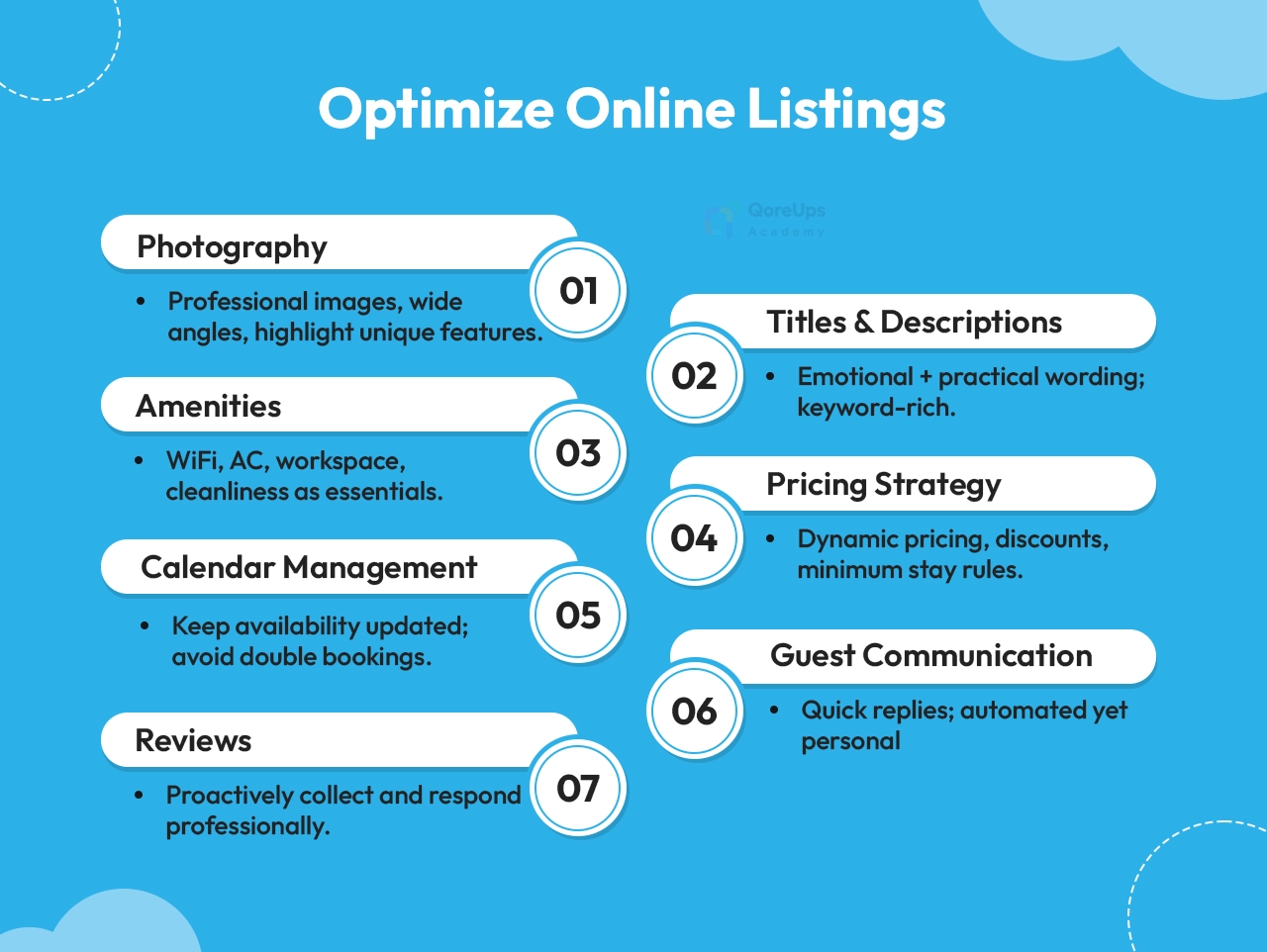
Simplify Booking and Guest Communication
Streamlining your communication process can dramatically improve operational efficiency. Clear, timely messaging helps create a smoother guest experience.
Recommended Communication Flow
You can manually or semi-automatically follow a proven communication schedule:
Booking Confirmation
Send a personalized message right after the booking is confirmed. Include check-in instructions, directions, and parking info.
Pre-Arrival Reminder
About 24–48 hours before arrival, remind guests about check-in time, any entry codes, and helpful travel tips (like traffic or weather).
In-Stay Check-In
A quick mid-stay message asking if everything is going well can boost satisfaction and help resolve issues before they turn into complaints.
Check-Out & Review Request
On the day of departure, send check-out instructions and ask kindly for a review.
Even if done manually or using basic templates, these simple steps can make a big difference in the guest experience and in your reviews.
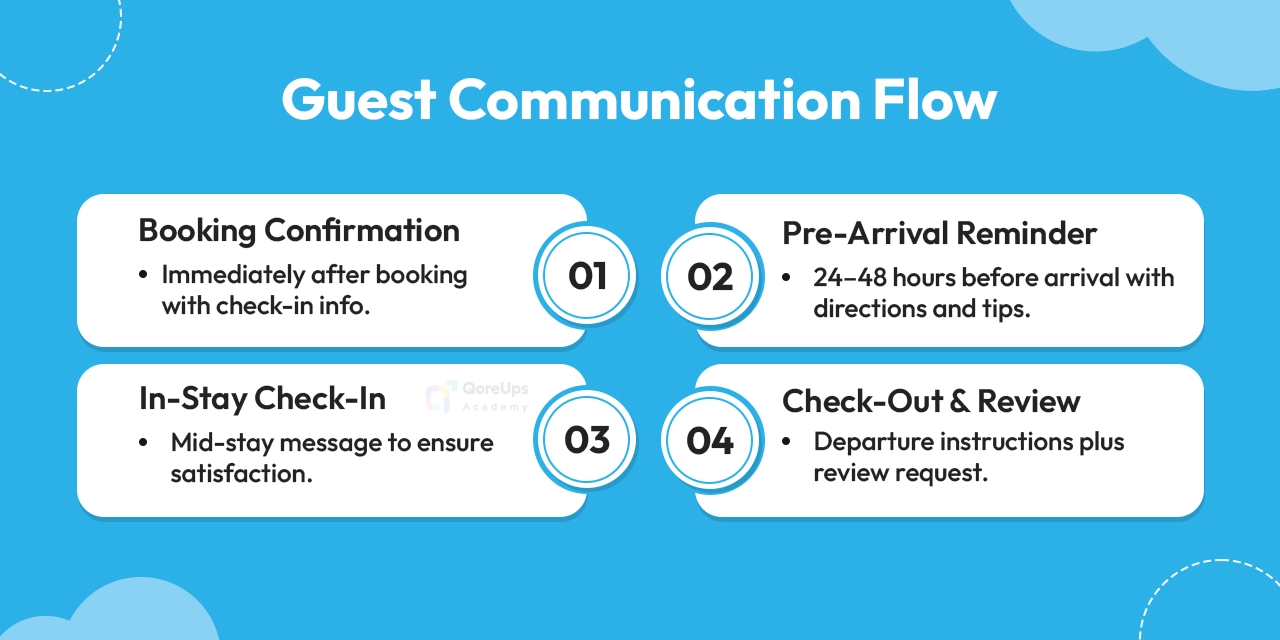
Manage Payments, Reviews, and Customer Experience
These are not just “maintenance” tasks; they’re central to reputation and profit.
Payment & Financial Management
- Choose a trusted payment provider that lets you collect payments in steps (like deposits and final payments) and securely hold a security deposit.
- Clear policies: cancellation, refunds, damage, extra charges (cleaning, late check‑out).
- Properly track all revenues and expenses. Use accounting tools or integrate with your PMS / software stack.
Reviews & Reputation
- Monitor feedback, both positive and negative. Learn what’s working, what isn’t.
- Respond to reviews: thank positive feedback, professionally address negatives.
- Use feedback to improve: if guests frequently complain about noise, better sound insulation; if about WiFi speed, upgrade it.
Upselling & Guest Experience
- Welcome packages, local guidebooks, recommendations.
- Personalized touches (e.g., wishes on special days, small gifts).
- Offer local experiences (tours, classes) or partnerships (transport, food) as upsells.
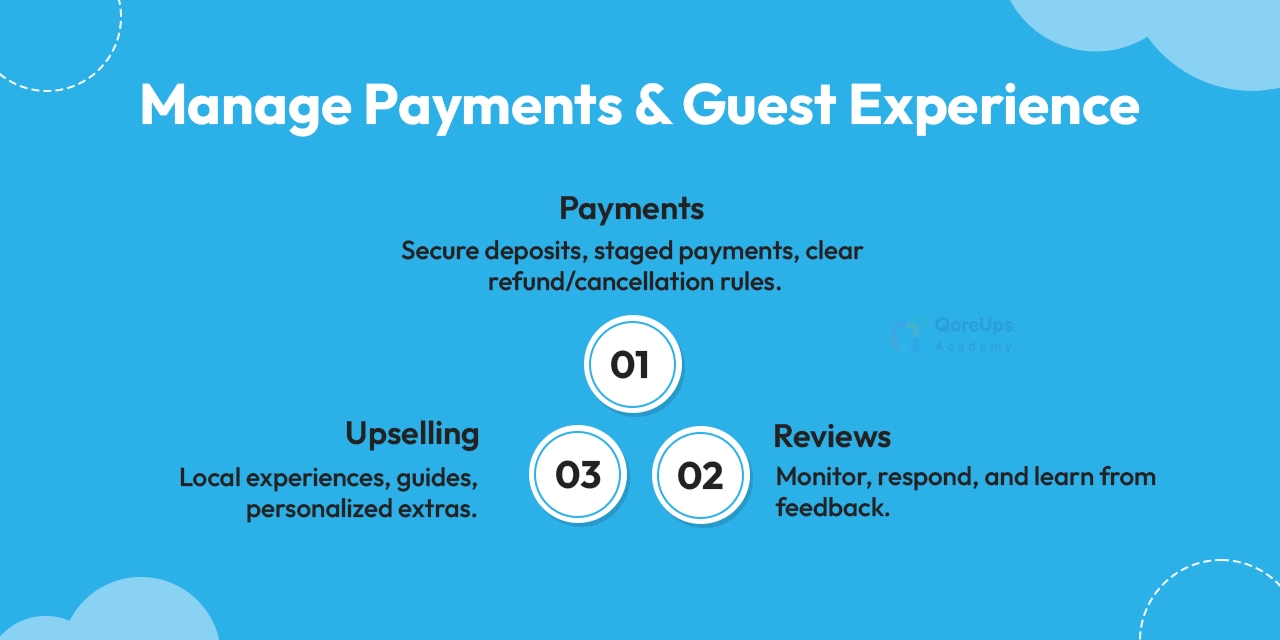
Grow and Scale Your Online Business
Scaling requires that your foundations are strong, and you add growth thoughtfully.
Strategies for Growth
- Scale incrementally: Add one or two properties first, refine systems, then expand.
- Diversify locations / property types: Different geographies smooth demand fluctuations; different property types appeal to different guests.
- Team building: Hire cleaners, property manager(s), maintenance, and guest support; define SOPs so quality doesn’t drop.
- Standardization: Cleaning checklists, amenity standards, and guest communication templates. Consistency builds reputation and eases scaling.
- Brand & marketing:
- Develop your brand identity (logo, tone of voice, style of decor) so each property feels part of a portfolio.
- Invest in a direct‐booking website, SEO, and email marketing. Gather guest emails and stay in touch.
- Use digital marketing: social media, influencer partnerships, and local search optimization.
- Develop your brand identity (logo, tone of voice, style of decor) so each property feels part of a portfolio.
- Use data to optimize operations:
- Monitor metrics: RevPAR, ADR, occupancy, error/complaints ratio, and maintenance cost per stay.
- Make decisions based on what properties perform well; drop or change underperforming ones.
- Stay aware of local event calendars and tourism trends to anticipate demand spikes.
- Monitor metrics: RevPAR, ADR, occupancy, error/complaints ratio, and maintenance cost per stay.
- Leverage technology heavily:
- Integrated tech stack: PMS + dynamic pricing + task management + smart home devices.
- Automation of repetitive tasks saves labor costs and reduces errors.
- Integrated tech stack: PMS + dynamic pricing + task management + smart home devices.
- Risk management and contingencies:
- Have a reserve fund for emergencies (major repairs, slow periods).
- Monitor regulatory changes—governments are increasingly regulating STRs.
- Insurance and guest screening are ongoing needs as you scale.
- Have a reserve fund for emergencies (major repairs, slow periods).
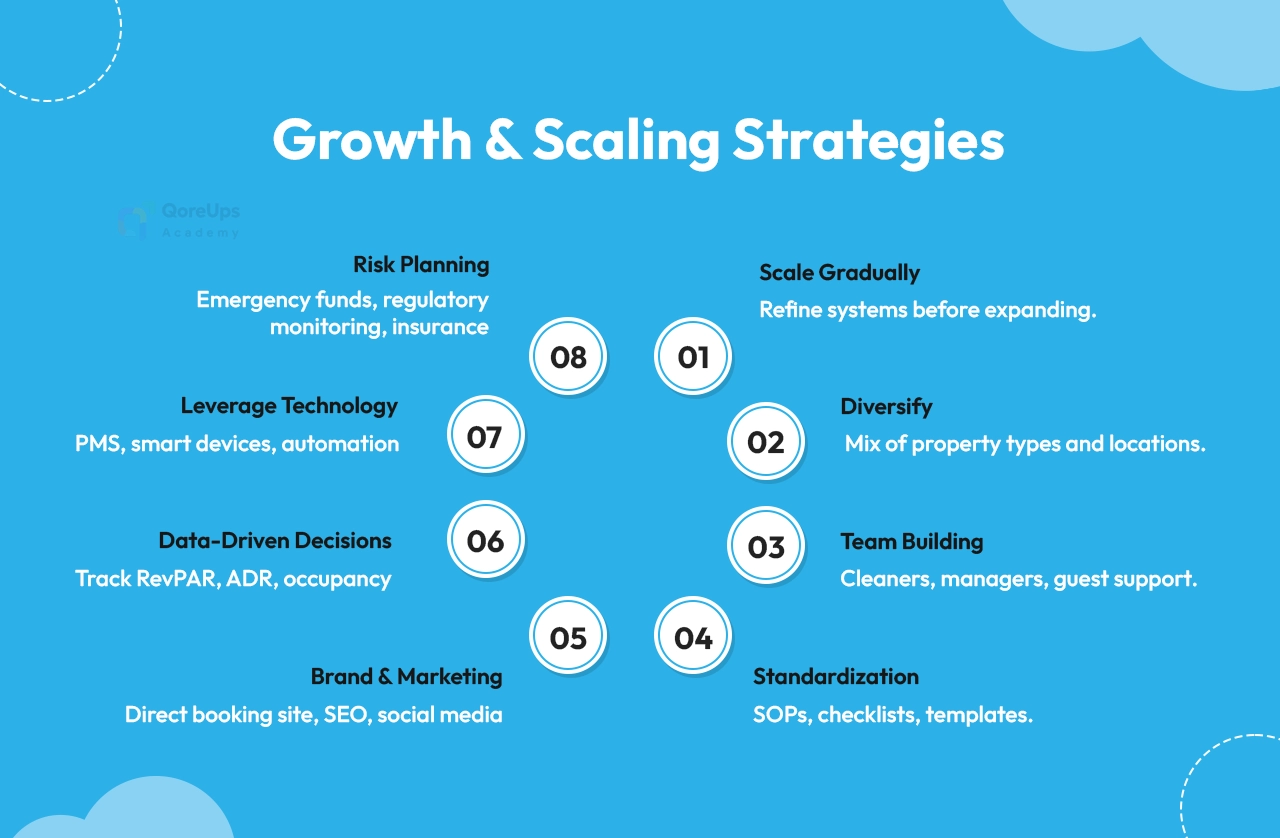
Advanced & Strategic Insights
These are less commonly discussed, but can give you an edge.
Long-stay vs Short-stay Mix
When setting up your rental business, it’s smart to plan for a mix of short and long stays:
- Short stays (1–3 nights) can bring in higher nightly rates but require more frequent cleaning, check-ins, and guest communication.
- Long stays (1–4 weeks) involve fewer turnovers, lower operating costs, and are easier to manage — especially helpful during off-peak seasons.
Tip: There’s growing demand for longer stays from remote workers and digital nomads.
Sustainability & eco‑friendly features
Guests increasingly prefer environmentally considerate properties (solar power, low energy lighting, plastic reduction, recycling). These can often justify a premium and positive reviews.
Local partnership
Collaborate with local guides, restaurants, and transportation providers to offer packages. It adds value, differentiates your properties, and offers additional revenue streams.
Crisis planning
Events like pandemics, travel restrictions, or political instability can quickly impact guest demand and bookings.
To protect your business:
- Offer flexible cancellation policies to build guest confidence
- Set clear refund terms to avoid confusion or disputes
- Maintain a financial buffer (emergency savings) to handle sudden drops in income
Being prepared for disruptions helps you stay resilient and maintain trust with your guests.
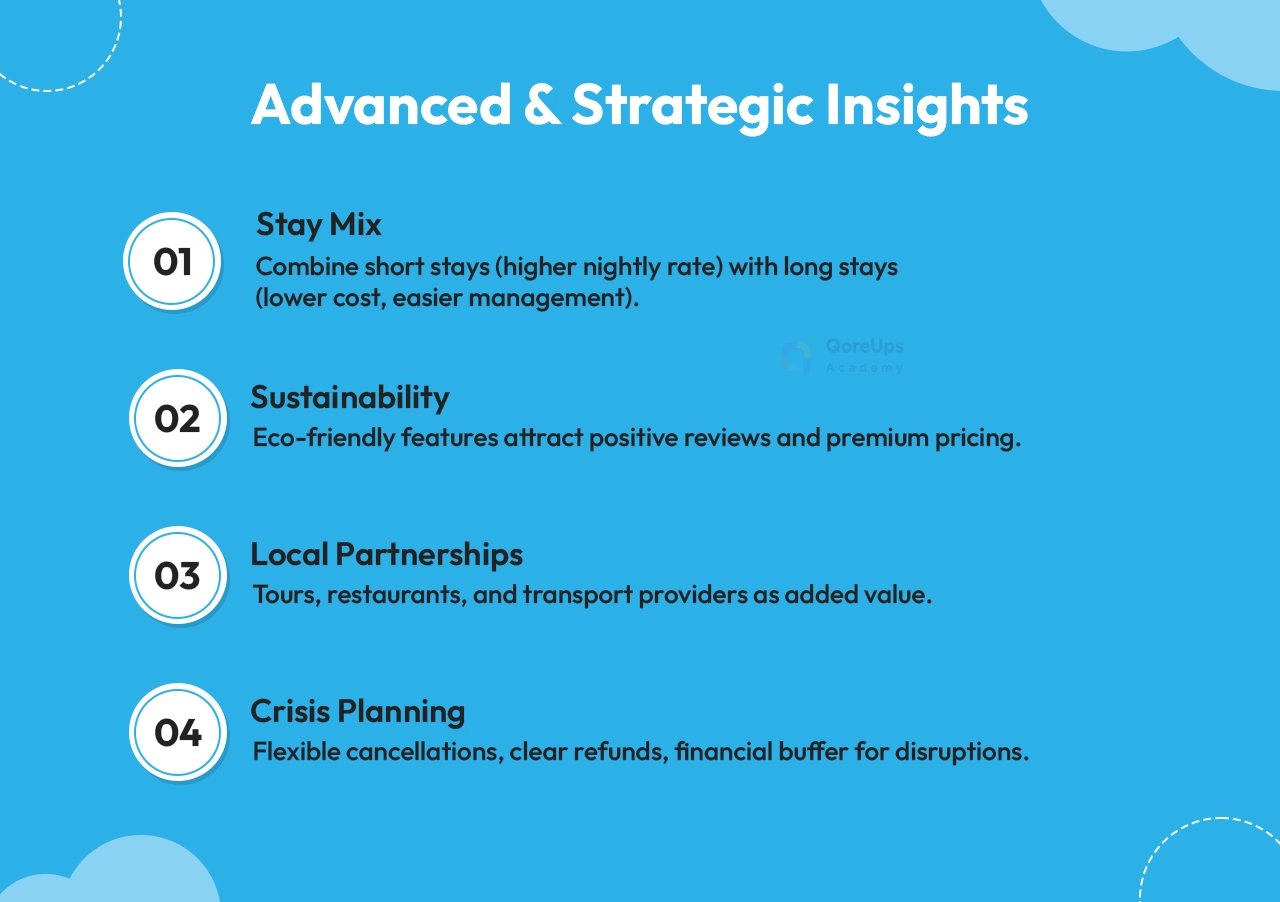
Let’s Bring It All Together
Starting an online vacation rental business is one thing — building one that lasts and grows is another.
Long-term success comes from balancing guest experience with smart systems, strong financial planning, and a clear growth strategy.
Whether you’re managing one property or planning to scale, here are the core elements that form a solid foundation:
- Know your costs, pricing strategy, and performance indicators (like occupancy rate, revenue per available night).
- Stay compliant with local regulations, set up the right business structure, and protect your assets.
- Invest in locations and amenities that appeal to your ideal guests — think fast Wi-Fi, comfortable beds, and smart self-check-in.
- Use vacation rental software that helps you manage bookings, payments, communication, and performance all in one place.
- Professional photos, clear descriptions, and fast responses lead to more bookings and better reviews.
- Create repeatable workflows that reduce manual work and improve consistency.
- Think long-term — expand with a clear brand, trusted partners, and data-driven decisions.
FAQs in Starting an Online Vacation Rental Business
1. How much money can I realistically make from vacation rentals?
Earnings depend on location, property type, occupancy, pricing, and costs. Typical occupancy rates range from 60–80% in popular markets, but seasonal dips can affect revenue. Using dynamic pricing and offering a mix of short and long stays can improve income stability.
2. Do I need special licenses or permits to run a vacation rental?
Yes. Many cities and municipalities require licenses, registration, or permits for short-term rentals. It’s critical to check local regulations, zoning laws, and lease agreements before listing your property to avoid fines or shutdowns.
3. What’s the difference between managing my own property and using a property management company?
Managing your own property means handling bookings, cleaning, guest communication, and maintenance yourself, which saves fees but requires time. Property managers handle these tasks for a fee, which is useful if you scale or own multiple properties.
4. How do I price my vacation rental competitively?
Use market research tools like AirDNA to analyze local demand and competitor rates. Consider seasonality, local events, and property features. Dynamic pricing tools can help adjust rates automatically for maximum revenue.
5. What features should I look for in vacation rental management software?
Look for the vacation rental software that offers:
- Booking management
- Search & filters
- Ratings & reviews
- Payment management
- Guest communication tools
- Reporting and analytics
- Cleaning/task management
6. Is it better to use OTA platforms or build my own booking software?
OTA platforms like Airbnb and Booking.com help you reach many guests but charge fees on each booking. Building your own booking software means you don’t pay these fees and can control how guests book and pay. Many successful vacation rental businesses use both OTAs for exposure and their own software to save costs and build loyal guests.
A Few More Articles For You to Read
Explore even more about the vacation rental business:
- To start a vacation rental business like Airbnb, check out How To Start A Vacation Rental Business Like Airbnb
- To choose among the best property management software, read How to Choose the Best Property Management Software for Vacation Rentals?
- If you’re considering building your own software, this guide will help you: Creating an Online Vacation Rental Software: Best Practices

